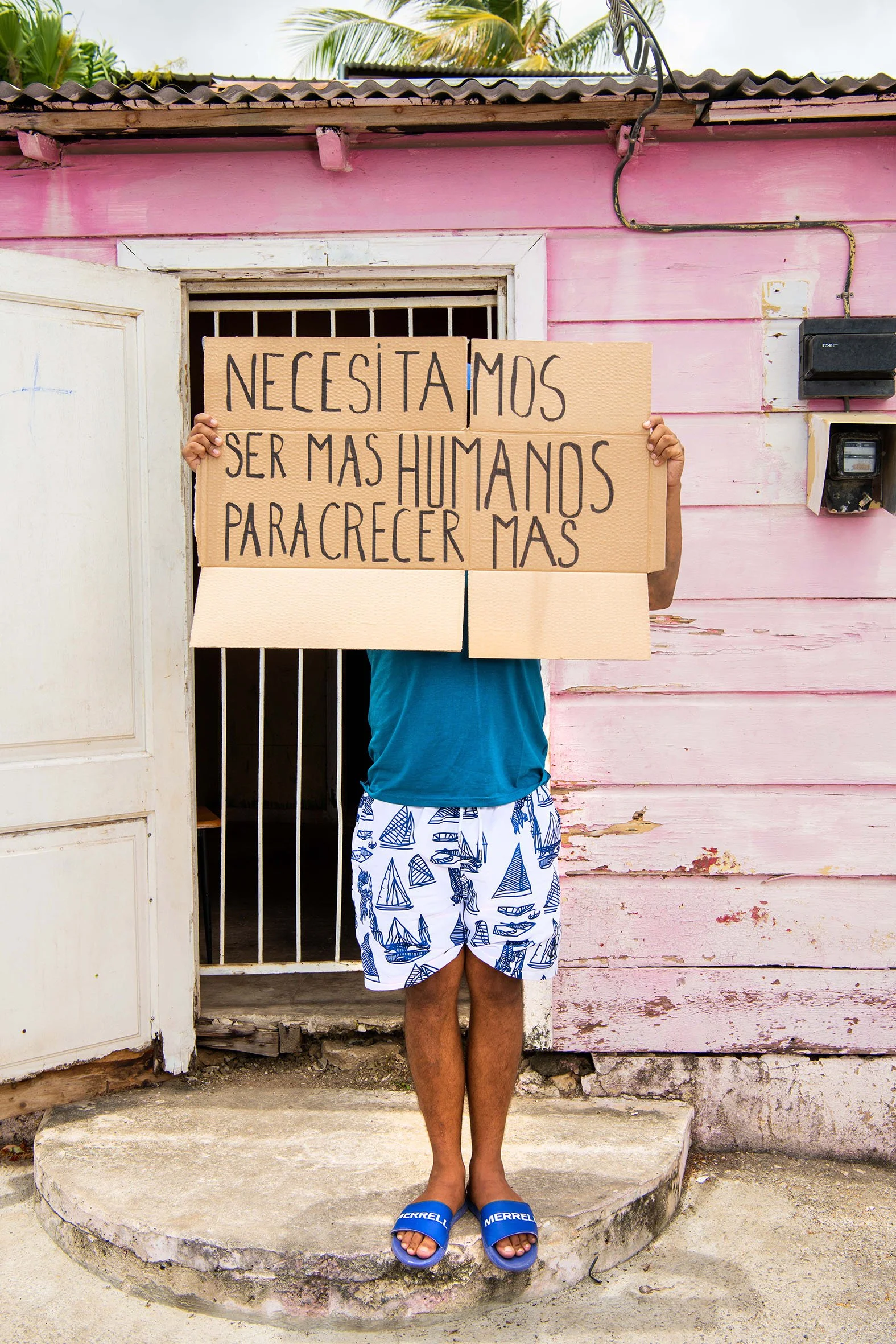Carlos
COUNTRY OF ORIGIN: VENEZUELA
AGE: 28
CHILDREN: 2 KIDS
ORIGINAL OCCUPATION: CAR MECHANIC
TIME ON THE ISLAND: 2 YEARS
I have risked my life 3 times to come here. This is the third time I’m on the island. It’s not a trip I would recommend anyone to take. We’re put in just a wooden little boat, always overloaded with too many passengers. I’m not from the coast, so I was nervous the first time. I’m from the city. I’m not used to be out on the sea. I keep throwing up the whole trip.
I’m from Barquisimeto and travelled 6 hours to get to Falcón, from where the boats leave. But when you get there it takes some time, sometimes months, to wait for a boat to leave. Sometimes the sea is too rough, sometimes the engines stop working or they have to fix the boat. They put you up in a house somewhere far. With no food and you can’t work because you have to be ready if they’re ready to do another crossing. It can happen that they get caught and are arrested too, because it’s human trafficking that they’re doing. It’s illegal in Venezuela as well. It’s a risk for us too, to stay in such a house. If the authorities find us there, we get arrested.
The crossing takes 9 hours, sometimes more. Where Venezuelan waters come together with Curaçao waters, the sea is different. They call it The Channel. That’s when they have to lower speed, which makes the journey even longer. When they finally get close to the island, they’ll throw you out anywhere they can. Their mission is to get you here, but they don’t care how you make it to land.
Some people come by yacht, not the wooden boats we came in. The trip by yacht is more expensive, but it’s safer. Those people sometimes bring their families and children. But it’s always a risk. Remember there have been 2 accidents. One was recently, when a boat of 38 people disappeared and was never found. They only found 1 person, with two bullets in the chest.
In 2017 I had finished working and was in the bus going home. The police stopped the bus and asked for everyone’s sedula. They arrested me and took me to the barracks. [The barracks are make-shift accomodations for the undocumented. They’re located on the prison grounds; Red.] It’s not good in there. When the guards are in a bad mood, they mistreated us or sometimes skip someone when giving out food. And you just have to wait until your family can buy you a ticket to Venezuela. If they can’t, you’re stuck in those barracks and left to rot in there. 20-30 men in 1 room. No ventilator. Mosquitoes. Just a few mattresses on the floor. It’s inhuman. When you finally get out you feel like never ever coming back. Back then I was lucky and after only 1 week my wife bought me a ticket to Venezuela.
Once back in Venezuela you realize that it’s still bad there too. One of the biggest petroleum countries in the world, now in a petroleum crisis. Some states in Venezuela have it better than others, but it’s still difficult. There’s food but very expensive. Making only $2 a month, you really can’t do anything else but buy food. No social life possible. Back in Venezuela my mom takes care of my two children. My wife and I are here trying to earn enough to send some back home. I want my kids to eat well. Not just the legumes that the government gives them. I want them to have meat and vegetables, salads. When I was working, I would send money every time I got paid. I was working in construction before the corona crisis, but there’s not much construction happening at the moment. I haven’t been able to send them any money so they’re eating only the legumes that come in the government boxes.
When I first came here my life got better, but when covid-19 came to the island it went back to bad. I’m lucky that I got the ‘karchi’ card from the Red Cross. At first, I was worried to register for the card, but we’ve been living with what I’ve gotten through the card. It has helped us out these past months. I’m very, very thankful for the money that came from The Netherlands and for the Red Cross for doing the distribution. It felt like taking a risk, to register, but it has been a great benefit. I get ANG 150,- per month for us as a couple. Since the crisis I’ve only had work a few days here and there, sometimes a week, but nothing regular. Our landlord kicked us out in the middle of the lockdown, because we couldn’t pay rent. We can’t just go and get any job that’s available. They won’t take us. We always have to keep a low profile. Move around without attracting any attention.
My dream is that people become nicer to each other like before the corruption. No one helps another out anymore. Even just getting a pill for a headache from someone will cost you. I’m working towards my goal of opening a toko back in Barquisimeto, like my parents did, and just live a normal life. To me, this crisis in Venezuela is like a learning curve. We Venezuelans were too lazy and spoiled before. The ones who don’t learn during this crisis are never gonna learn.
The crossing is horrible, but horrible to hopefully become successful. Because if you don’t shoot, you’ll always miss. If we stay there, we die from hunger or something else. We come here looking for a future. Sometimes it works out and sometimes it all comes to a halt, but we have to keep moving forward.
